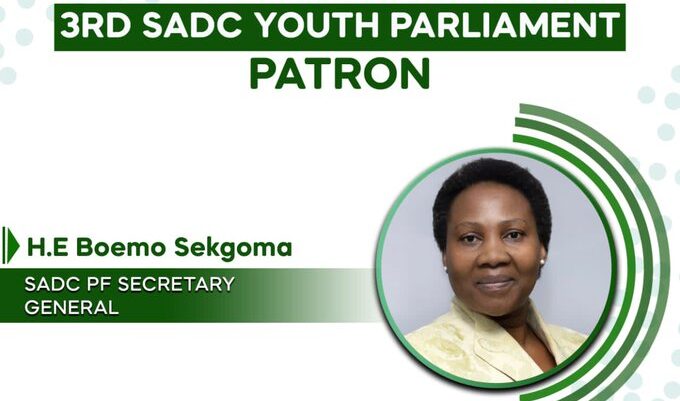
Member of the Political Bureau of the Communist Party of China Central Committee and Foreign Minister Wang Yi fields questions from local and foreign journalists during a press conference on the sidelines of the second session of the 14th National People's Congress in Beijing, China (pic. Xinhua)
The Pan Afrikanist Watchman / Xinhua News Agency
On March 7, 2024, The Pan Afrikanist joined a press conference that was held on the margins of the Second Session of the 14th National People’s Congress at the Media Center, during which Member of the Political Bureau of the CPC Central Committee and Foreign Minister Wang Yi answered questions from Chinese and foreign media about China’s foreign policy and external relations.
Wang Yi: Friends from the media, good morning. I am very pleased to meet you again during the NPC and CPPCC sessions. The world landscape today is undergoing profound transformation, and human society is confronted with multiple challenges. In this changing and turbulent international environment, China will remain a staunch force for peace, stability and progress of the world. In his report to the 20th National Congress of the Communist Party of China (CPC), General Secretary Xi Jinping pointed out that although this is an era fraught with challenges, it is also an era brimming with hope. China will stand firmly on the right side of history and on the side of human progress, and will advocate vigorously peace, development, cooperation and mutual benefit. It will pursue its development along with its efforts for peace and development of the world, and at the same time, it will make greater contributions to world peace and development through its own development. It was also stressed in the report that the CPC is dedicated both to pursuing happiness for the Chinese people and rejuvenation for the Chinese nation and to promoting human progress and world harmony. That is our mission and our duty. It is also our aspiration and our goal. With that, I’m ready to take your questions.

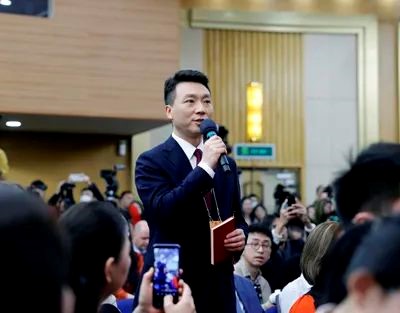
China Central Television: Could you talk us through China’s most impressive diplomatic achievements in the past year? At the Central Conference on Work Relating to Foreign Affairs, it was pointed out that major-country diplomacy with Chinese characteristics would enter a new stage where much more could be accomplished. Could you share with us in what areas of its diplomacy China will seek to accomplish more?
Wang Yi: The year 2023 not only witnessed pioneering efforts but also great harvests in China’s diplomacy. Under the strong leadership of the CPC Central Committee with Comrade Xi Jinping at its core, the Chinese foreign service fully implemented the guiding principles set forth at the 20th CPC National Congress. We took steps to promote international solidarity and cooperation, and offered solutions to crises and challenges. We contributed to world peace and development, and broke new ground in China’s diplomatic theory and practice.In the past year, President Xi Jinping hosted two major diplomatic events in China, attended three multilateral summits, made four important overseas visits, and had more than 100 meetings and phone calls. Head-of-state diplomacy is getting increasingly irreplaceable in providing strategic guidance. The Central Asian region and the Indochina Peninsula all embraced the vision of a community with a shared future for mankind, and new progress was made in the joint efforts by China and African, ASEAN, Arab, and Latin American and Caribbean countries to realize the same vision. The Third Belt and Road Forum for International Cooperation was a success, taking Belt and Road cooperation to a new stage of high-quality development. BRICS achieved a historic expansion, opening a new chapter of united strength for the Global South. We facilitated the historic reconciliation between Saudi Arabia and Iran, and mediated a ceasefire agreement in northern Myanmar. We promoted political settlement of all hotspots and conflicts. We resolutely opposed all hegemonic and bullying acts, and effectively safeguarded China’s sovereignty, security and development interests as well as the common interests of developing countries. We conducted diplomacy to serve the Chinese people and to fully support the development and stability of the country.At the Central Conference on Work Relating to Foreign Affairs at the end of last year, President Xi Jinping outlined a comprehensive plan for China’s external work for the present and beyond, which was a top-level design for China’s diplomatic strategy on the new journey. We will study and implement the guiding principles of the Conference in real earnest. We will follow the guidance of Xi Jinping Thought on Diplomacy, focus on building a community with a shared future for mankind, and act with a stronger sense of historical responsibility and a more vibrant spirit of innovation to accomplish more in our major-country diplomacy with Chinese characteristics.We will be more confident and self-reliant in cultivating the features of China’s diplomacy. Our national development and rejuvenation will always be based on our own efforts, and the future of the Chinese people will always be in our own hands. We will remain firm in pursuing the independent foreign policy of peace, and resolutely safeguard China’s sovereignty and national dignity.We will be more open and inclusive and conduct diplomacy with a broad vision. We will consolidate and expand our global network of partnerships, promote a new type of international relations, and promote mutual respect and mutual learning between civilizations. We will strive for stability in major-country relations, common progress with our neighbors, and rejuvenation with fellow countries in the Global South.We will uphold fairness and justice, and further establish the ethos of China’s diplomacy. We will practice true multilateralism, and promote greater democracy in international relations. We will be more unequivocal on issues of principle concerning the legitimate rights and interests of developing countries and the future of humanity, and will shoulder greater moral responsibility and press ahead in the right direction of history.We will promote win-win cooperation, and stay true to the ideal of China’s diplomacy. We will stay on the right path of seeking solidarity and cooperation, offer more solutions with Chinese wisdom to regional hotspots and global issues, and provide more public goods in the interest of world peace and development. China’s new development will bring about new opportunities to the world.
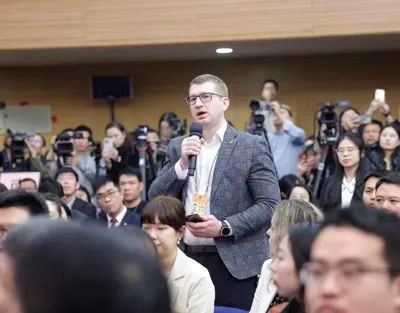
Rossiya Segodnya: This year marks the 75th anniversary of diplomatic ties between Russia and China. The bilateral relationship has grown to an unprecedented level in recent years. Given the ongoing global transition in international relations, what is the most effective way to tap the potential of Russia-China cooperation?
Wang Yi: Under the strategic guidance of President Xi Jinping and President Vladimir Putin, the China-Russia comprehensive strategic partnership of coordination for the new era has been moving forward on a high level. Political mutual trust is deepening. Cooperation remains mutually beneficial and complementary to each other. The two peoples are enthusiastic about mutual exchanges. Last year, bilateral trade reached a record US$240 billion, hitting the target of US$200 billion ahead of schedule. Russian natural gas is fueling numerous Chinese households, and Chinese-made automobiles are running on Russian roads. All this shows the strong resilience and broad prospects of China-Russia mutually beneficial cooperation.Maintaining and growing the China-Russia relationship is a strategic choice by the two sides based on the fundamental interests of the two peoples. It is also what we must do to keep pace with the trend of the world. As key major countries of the world and permanent members of the U.N. Security Council, China and Russia have forged a new paradigm of major-country relations that differs entirely from the obsolete Cold War approach. On the basis of non-alliance, non-confrontation and not targeting any third party, China and Russia strive for lasting good-neighborliness and friendship and seek to deepen their comprehensive strategic coordination. In today’s world, hegemonism finds no support, and division leads nowhere. Major countries should not seek confrontation, and the Cold War should not be allowed to come back. The China-Russia relationship moves ahead along the trend of the times toward multipolarity and greater democracy in international relations, and is thus very important for maintaining global strategic stability, enabling positive interactions among major countries, and promoting cooperation among emerging major countries.This year marks the 75th anniversary of China-Russia diplomatic relations. The two sides will also jointly launch the China-Russia Years of Culture. The relationship faces new opportunities. China is ready to work with Russia to foster new driving forces for cooperation and steadily enhance the foundation of friendship between the two peoples. With Russia chairing the BRICS mechanism this year and China taking over the chairship of the Shanghai Cooperation Organization (SCO) in the second half of the year, the two sides will strengthen international and multilateral coordination, practice true multilateralism, uphold the U.N.-centered international system, and safeguard regional and global security and stability.
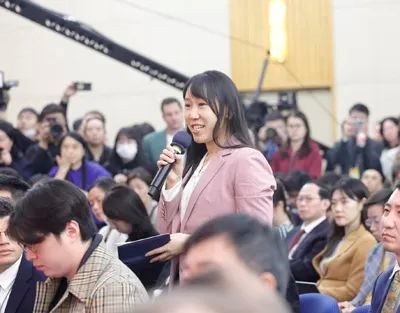
People’s Daily: At the Central Conference on Work Relating to Foreign Affairs, it was pointed out that building a community with a shared future for mankind is China’s lofty goal in conducting major-country diplomacy with Chinese characteristics for the new era. In recent years, China has announced it would strive for that goal together with quite a number of countries. How do you see the prospect of building a community with a shared future for mankind?
Wang Yi: Building a community with a shared future for mankind is the core tenet of Xi Jinping Thought on Diplomacy. It is China’s solution to the question of what kind of world to build and how to build it.President Xi Jinping has stressed many times that humanity live in the same global village and travel in the same boat. Facing various global challenges coming our way, countries should rise above their differences in history, culture, geography and system, and work together to protect the Earth, the only inhabitable planet for us all, and make it a better place. This important tenet demonstrates President Xi Jinping’s broad historical vision and deep passion for the world as the leader of a major country. It goes beyond the obsolete zero-sum game mentality, assumes the moral high ground of civilization, and captures the shared aspirations of all nations. It points the right direction for humanity at a historical inflection point where accelerated transformation unseen in a century is unfolding across the world. Building a community with a shared future for mankind has become a glorious banner leading the progress of the times. It is also the lofty goal of our major-country diplomacy with Chinese characteristics for the new era.It’s been 10 fruitful years for this vision since President Xi Jinping put it forward. It has developed from a conceptual proposition to a scientific system, from a Chinese initiative to an international consensus, and from a promising vision to practical outcomes, showing strong vitality. From bilateral partners to multilateral institutions, from regional frameworks to global initiatives, and from public health to cyberspace and oceans, China has been building communities with a shared future with scores of countries and regions in multiple forms and domains. Time and again, the vision has been written into U.N. General Assembly resolutions as well as resolutions and declarations of the SCO, BRICS and other multilateral mechanisms.The evolution of the international situation in recent years shows again and again that the number-one reality in today’s world is that all countries rise and fall together, and that the sure path to meeting the challenges is mutual assistance and win-win cooperation. More and more countries and peoples have come to realize that the future of humanity should be decided by all countries together, and that the future of the world should be built by all peoples together. China is ready to work with all countries to build an open, inclusive, clean and beautiful world of lasting peace, universal security and shared prosperity. The road ahead may be tortuous, but the future is bright.
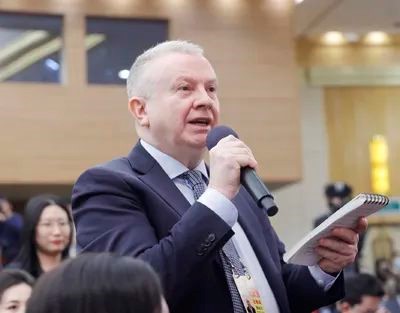
Bloomberg: After last year’s meeting in San Francisco, China and the U.S. agreed to jointly manage differences and promote mutually beneficial cooperation. Since then, the U.S. has continued to increase its trade and technological restrictions on China. How does China think this trend will change? How does China plan to respond?
Wang Yi: The China-U.S. relationship is critical to the well-being of the two peoples, and to the future of humanity and the world. No matter how the international landscape evolves, China always keeps its U.S. policy stable and consistent, and always handles the relationship with a sense of responsibility for history, for the people and for the world.Our position is the three principles proposed by President Xi Jinping—mutual respect, peaceful coexistence, and win-win cooperation. They are a statement of the experiences and lessons of the 50-plus years of China-U.S. relations, and represent the right way for interactions between major countries. They should be observed and acted upon by both sides.Specifically, mutual respect is the precondition, because interaction sustains only when differences in social and political systems are respected and acknowledged. Peaceful coexistence is the baseline, because conflict and confrontation between two major countries like China and the U.S. have unimaginable consequences. Win-win cooperation is the goal, because when working together, China and the U.S. can do great things conducive to the two countries and the world.At the historic meeting in San Francisco last November, the two presidents reached common understandings and charted the course for stabilizing the China-U.S. relationship and bringing it back on the track of sound development. President Xi Jinping elaborated on China’s fundamental approach and principled position on developing relations with the United States. President Biden reiterated that the U.S. does not seek a new Cold War, does not seek to change China’s system, does not seek to revitalize its alliance against China, and does not support “Taiwan independence.” He also stated that the U.S. is glad to see prosperity in China, and does not seek to contain or suppress China’s development or to decouple with China.There has been some improvement in China-U.S. relations since the summit in San Francisco. This meets the interests and wishes of people of both countries and the world. But it has to be pointed out that U.S. misperception toward China continues and U.S. promises are not truly fulfilled. The U.S. has been devising various tactics to suppress China and kept lengthening its unilateral sanctions list, reaching bewildering levels of unfathomable absurdity. If the U.S. says one thing and does another, where is its credibility as a major country? If it gets jittery whenever it hears the word “China,” where is its confidence as a major country? If it only wants itself to prosper but denies other countries’ legitimate development, where is international fairness? If it persistently monopolizes the high end of the value chain and keeps China at the low end, where is fairness in competition? The challenge for the U.S. comes from itself, not from China. If the U.S. is obsessed with suppressing China, it will eventually harm itself. We urge the U.S. to be clear-eyed about the trend of the times, view China’s development objectively and rationally, engage in exchanges with China proactively and pragmatically, and act to fulfill its commitments. We hope that it will work with China to bring the relationship back on the track of stable, sound and sustainable development.This year marks the 45th anniversary of China-U.S. diplomatic relations. President Xi Jinping pointed out that the hope of the China-U.S. relationship lies in the people, its foundation is in grassroots connections, its future depends on the youth, and its vitality comes from subnational exchanges. China is always ready to strengthen dialogue and exchanges with the U.S. and promote friendly exchanges in various sectors, so as to build more bridges for mutual understanding and remove unnecessary misunderstanding and biases. We believe that the two sides are fully able to find a right path for the two different major countries to get along with each other.
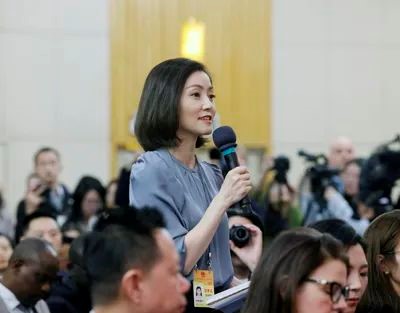
Xinhua News Agency: Many leaders around the world believe that the current international order fails to reflect and adapt to the shifting power dynamics of the world. China’s proposal to build “an equal and orderly multipolar world and a universally beneficial and inclusive economic globalization” has drawn wide attention and support from the international community. Could you further elaborate on this?
Wang Yi: Multipolarity and economic globalization are the prevailing trends in the advancement of human society. But there are different views on what they should look like. China believes in an equal and orderly multipolar world and a universally beneficial and inclusive economic globalization.An equal multipolar world means equal rights, equal opportunities, and equal rules for every nation. Certain or a few powers should not monopolize international affairs. Countries should not be categorized according to their strength. Those with the bigger fist should not have the final say. And it is definitely unacceptable that certain countries must be at the table while some others can only be on the menu. We must ensure that all countries, regardless of their size and strength, are able to take part in decision-making, enjoy their rights, and play their role as equals in the process toward a multipolar world.An orderly multipolar world means all should observe the purposes and principles of the U.N. Charter, and uphold the universally recognized basic norms governing international relations. Multipolarity doesn’t mean multiple blocs, or fragmentation, or disarray. All countries must act within the U.N.-centered international system, and pursue cooperation under global governance.Universally beneficial globalization means growing the economic pie and sharing it more fairly. All nations, all social groups, and all communities should be able to take part in economic and social development and share the benefits. Development imbalance, be it national or international, should be settled properly so as to realize common prosperity and development.Inclusive globalization means supporting countries in pursuing a development path suited to their own national conditions. No one should impose one single development model onto the whole world. Unilateralism and protectionism for selfish gains at the expense of others must be discarded to keep the global industrial and supply chains stable and unimpeded, and to sustain the robust and dynamic growth of the world economy.China is ready to work with all countries to steer multipolarity and economic globalization toward the right direction as expected by the whole world, and to make global governance more just and equitable.
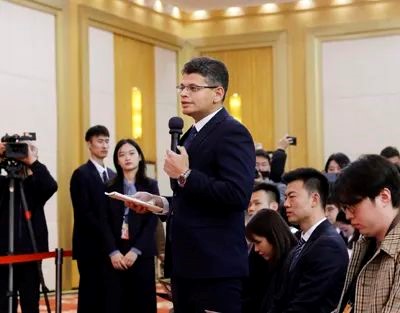
Nile News Egyptian Network: How can the international community provide protection necessary for the Palestinian people? China’s just position on the Palestinian question has been commended by Arab countries. What will be the way out of the Palestinian-Israeli conflict? What role will China play to this end? Wang Yi: The current Palestinian-Israeli conflict has caused 100,000 civilian casualties, and countless innocent people remain buried under the rubble. There is no distinction between noble and humble lives, and life should not be labeled by race or religion. The failure to end this humanitarian disaster today in the 21st century is a tragedy for humanity and a disgrace for civilization. Nothing justifies the protraction of the conflict, or the killing of the civilian population. The international community must act promptly to promote an immediate ceasefire as its overriding priority and ensure humanitarian assistance as its pressing moral obligation. People in Gaza have the right to life in this world, and women and children deserve the care from their families. All detainees should be released, and all actions that harm civilians should be stopped.The calamity in Gaza is another wake-up call for the world that the long occupation of the Palestinian territories is a fact that should not be ignored anymore, and that the long-cherished aspiration of the Palestinians for an independent state should not be evaded anymore. More importantly, the historical injustice to the Palestinians must not be allowed to continue uncorrected from generation to generation. Restoring justice to the Palestinian people and fully implementing the two-State solution is the only way to break the vicious cycle of Palestinian-Israeli conflicts, to eliminate the breeding ground of extremist ideologies, and to realize enduring peace in the Middle East.China firmly supports the Palestinian peoples’ just cause of regaining their legitimate national rights, and is always committed to a comprehensive, just and lasting solution to the question of Palestine at an early date. We support Palestine’s full membership in the U.N., and urge certain U.N. Security Council member not to lay obstacles to that end. We call for a more broad-based, more authoritative, and more effective international peace conference to work out a timetable and road map for the two-State solution. We believe that Palestine and Israel should resume peace talks as soon as possible to achieve the ultimate goal that they coexist in peace as two states and the Arab and Jewish peoples live in harmony as two ethnic groups. China will continue to work with the international community to restore peace, save lives, and uphold justice.
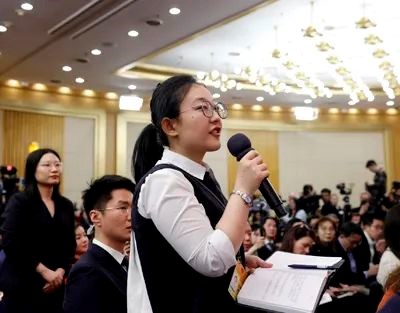
Beijing Youth Daily: Over the past year, China mediated the resumption of diplomatic ties between Saudi Arabia and Iran, the deescalation in northern Myanmar, among others. These diplomatic efforts were highly commended by the international community. Many say that only China is capable of doing that. Could you share with us what makes China’s mediation successful?
Wang Yi: Constructive engagement in settling international hotspot issues is a due responsibility for China as a permanent member of the U.N. Security Council. We learn from international practices and draw wisdom from Chinese culture, and we have found the Chinese way to address hotspot issues.
In my view, the following four commitments are vitally important. First, a commitment to non-interference in internal affairs. China always respects the sovereignty and territorial integrity of the countries concerned, and plays good offices in light of their needs and wishes and in line with the U.N. Charter.
Second, a commitment to political settlement. In addressing disagreements and disputes, willful use of force should not be allowed, let alone relying obsessively on pressure and sanctions.
What is needed is to advance dialogue and consultation with the utmost patience and find the biggest common ground that accommodates the needs of all sides. On all hotspot issues, China always promotes talks for peace. We never add fuel to the fire.
Third, a commitment to objectivity and impartiality. China forms its stance based on the merits of each issue. We do not use double standards, or favour one side over the other, or seek selfish geopolitical interests. All peoples in the world have a sense of justice in their hearts. Credibility comes before influence.
Fourth, a commitment to addressing both symptoms and root causes. It is important to deflate tensions as quickly as possible to prevent escalation or spillover, and at the same time, it is also crucial to look into the root causes in a systemic and dialectical way and take a holistic approach to resolving disputes.
Band-aid solutions are not advisable, nor are short-sighted, utilitarian, or finger-pointing tactics. Our world is far from being tranquil, and peace needs to be upheld by us all. We will work with all countries to build consensus for ending conflicts, pave the way for peace talks, and strive for a world of lasting peace and common security.
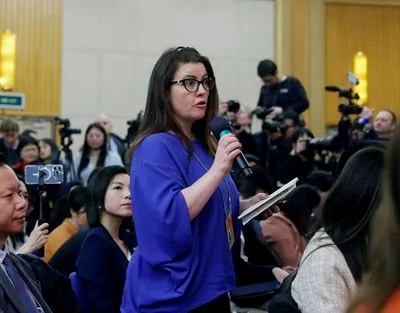
Agencia EFE: What are the prospects regarding China’s relationship with the European Union? What does China expect from Europe? And why does China think some European countries have so far not joined the Belt and Road Initiative (BRI)?
Wang Yi: Last year was the 20th anniversary of the China-EU comprehensive strategic partnership. The two sides relaunched exchanges and dialogue across the board at all levels. The China-Europe Railway Express ran more than 17,000 cargo trips connecting 219 cities in 25 European countries. It is a lifeline that ensures safe and unimpeded industrial and supply chains in a turbulent world. China rolled out visa-free policies for quite some European countries, facilitating travels and business exchanges. On the BRI you mentioned, in fact, there have been many successful China-Europe cooperation projects under the Initiative. The Budapest-Belgrade railway link, the Port of Piraeus in Greece and the Pelješac Bridge in Croatia are just a few typical examples.A few years back, an EU policy paper labeled China as a partner, competitor and systemic rival at the same time. However, facts have shown that this characterization is neither consistent with reality nor viable. On the contrary, it only caused distractions and created obstacles for China-EU relations. It’s like driving to a crossing and finding the red, yellow and green lights all on at the same time. How can you drive on?In fact, China and Europe do not have clashing fundamental interests between them, or geopolitical and strategic conflicts. Their common interests far outweigh their differences. In the context of China-EU relations, the two sides should be characterized rightly as partners. Cooperation should be the defining feature of the relationship, autonomy its key value, and win-win its future. We hope that China-EU relations will move ahead smoothly with green lights at every crossing.A strong Europe is in the long-term interests of China. Likewise, a strong China is also in the fundamental interests of Europe. China and Europe should work together to practice multilateralism, advocate openness and development, and facilitate dialogue between civilizations. In today’s world, as long as China and Europe engage in mutually beneficial cooperation, no attempt to create bloc confrontation will succeed; as long as China and Europe stay committed to openness and win-win, deglobalization will not prevail.
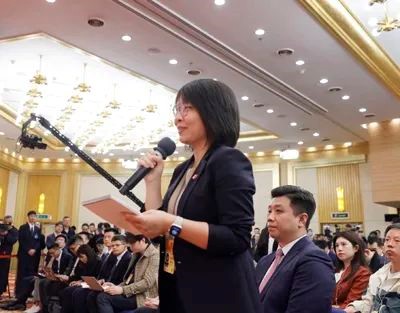
Lianhe Zaobao: Following the elections in the Taiwan region, there have been concerns that tensions will further rise across the Taiwan Strait. Do you think that the prospect of peaceful reunification is diminishing? What is your take on the current situation across the Taiwan Strait?Wang Yi: The elections in Taiwan are just local elections in one part of China. The result does not change, even in the slightest terms, the basic fact that Taiwan is part of China. Nor does it change the historical trend of Taiwan’s return to the motherland. Since the elections ended, more than 180 countries and international organizations have reaffirmed their commitment to the one-China principle and their support for China in safeguarding its sovereignty and territorial integrity. This sufficiently proves that the one-China principle is already a prevailing international consensus. Those who connive at and support “Taiwan independence” are just challenging China’s sovereignty. Certain countries that still insist on maintaining official relations with Taiwan are just interfering in China’s internal affairs. I believe that some day, there will be a family photo of the whole international community in which all members uphold the one-China principle. It is only a matter of time.The separatist activities for “Taiwan independence” are the most destructive elements to the peace and stability across the Taiwan Strait. To truly safeguard cross-Strait peace, we must unequivocally oppose “Taiwan independence.” The stronger the commitment to the one-China principle is, the greater the guarantee for the peace across the Strait will be.Our policy is quite clear—we will continue to strive for peaceful reunification with the greatest sincerity. Our bottom line is also quite clear—we will never allow Taiwan to be separated from the motherland. Whoever engage in “Taiwan independence” on the island will be held accountable by history. Whoever in the world connive at and support “Taiwan independence” will get burned for playing with fire and taste the bitter fruit of their own doing.People on both sides of the Taiwan Strait share a close kinship, and our roots as one nation cannot be severed. All people of Chinese descent should uphold the overall interests of the Chinese nation, jointly oppose “Taiwan independence,” and support peaceful reunification.
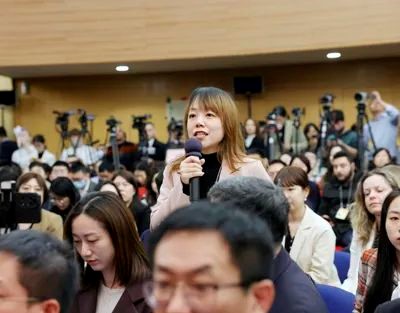
Global Times: China’s neighborhood diplomacy in 2023 began with the China-Central Asia Summit and concluded on a high note with the agreement between China and Viet Nam to build a community with a shared future that carries strategic significance. Many believe that this shows China’s pursuit of neighborhood diplomacy featuring amity, sincerity, mutual benefit and inclusiveness has come to fruition. How do you envision China’s neighborhood diplomacy this year?
Wang Yi: The Chinese people have a saying that a close neighbor is better than a distant relative. China and its neighboring countries will always be there for each other, and Asia is our common home. Making it a better place is the shared hope of all countries in the region.
Since President Xi Jinping initiated our neighborhood diplomacy featuring amity, sincerity, mutual benefit and inclusiveness, we have worked with our neighbors to open up new prospects for good neighborliness and friendship, and have found the distinctive Asian way for getting along well with each other.
We stay committed to forging friendship with our neighbors. We respect each other’s core and major concerns, maintain frequent high-level exchanges, and endeavor to increase mutual understanding and affinity among our peoples.
The idea of good neighborliness and friendship has won stronger popular support, and the vision of a community with a shared future has taken root in the hearts of our peoples. We stay committed to treating each other with sincerity.
We believe in seeking common ground while shelving differences, accommodating each other’s comfort levels, enhancing understanding and trust through candid communication, and settling differences and frictions through dialogue and consultation. We work together to tackle risks and challenges, and stand side by side as good neighbors in trying times.
We stay committed to mutual benefit. We make good use of our complementary strengths to help each other achieve development and revitalization. A large number of cooperation projects, such as the China-Laos railway, the China-Pakistan Economic Corridor, the China-Central Asia natural gas pipeline, the China-Malaysia twin industrial parks, and the Jakarta-Bandung high speed railway, have boosted growth in the region.
We stay committed to openness and inclusiveness. We practice open regionalism, take an active part in East Asian cooperation, support ASEAN centrality, and promote deeper and more substantive China-Japan-ROK trilateral cooperation. The China-Central Asia Summit and the Lancang-Mekong Cooperation mechanism have made robust progress.
The SCO has become a regional organization that covers the largest area and population in the world. This year marks the 70th anniversary of the Five Principles of Peaceful Coexistence. Although born in Asia, the five principles transcend differences in social system and ideology.
They have become basic norms governing international relations and fundamental principles of international law, contributing the wisdom of the East to properly handling state-to-state relations. Seventy years later, the Five Principles of Peaceful Coexistence are not outdated. They are even more relevant and vibrant than ever.
China stands ready to work with our neighbors to carry forward the Five Principles of Peaceful Coexistence toward building a community with a shared future for Asia and for mankind, so that Asia can continue to contribute to world peace and provide impetus to global growth.
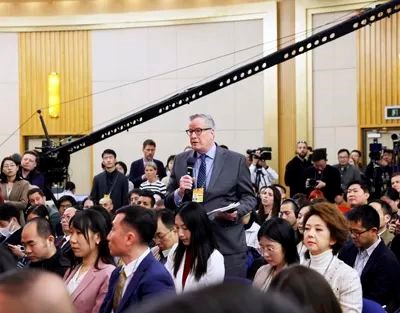
China Global Television Network: The Ukraine crisis still shows no sign of abating. During last month’s Munich Security Conference, you said that all China has done is to promote peace. When do you think the parties will be able to return to the negotiating table?
Wang Yi: On the Ukraine issue, China has all along held an objective and impartial position and promoted peace talks. President Xi Jinping had in-depth exchanges with world leaders including those of Russia and Ukraine. China has also published its position paper, and its special representative has traveled intensively to mediate among different parties.
All our efforts point to one goal, that is, to pave the way for ending the conflict and starting peace talks. One strong impression we got at the recent Munich Security Conference is that, as more and more people begin to worry about a possible lose-lose outcome, they are ready to create conditions to explore a reliable way out of this crisis.
Past experience shows that a conflict, when prolonged, tends to deteriorate and escalate, even to the extent unthinkable for parties concerned. In the absence of peace talks, misperception and miscalculation will accumulate and may lead to an even bigger crisis. Lessons in this regard should not be forgotten.
All conflicts have to end at the negotiating table. The earlier the talks start, the sooner peace will arrive. As long as all parties abide by the purposes and principles of the U.N. Charter, and their legitimate concerns are properly addressed, a balanced, effective and sustainable security architecture can and will be established in Europe.
President Xi Jinping has put forward four points about what must be done. They are China’s fundamental guide in seeking a political settlement of the Ukraine crisis. China supports the holding in due course of an international peace conference that is recognized by both Russia and Ukraine and ensures the equal participation of all parties and fair discussions on all peace plans.
China looks forward to the early restoration of peace and stability on the European continent and will continue to play a constructive role to this end.
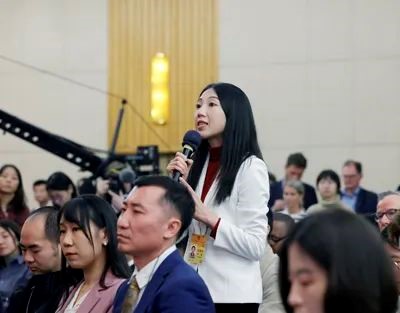
China News Service: How will China’s diplomacy better serve Chinese modernization? Some have expressed concerns over China’s development prospect, what is your response?Wang Yi: China’s economy grew by 5.2 percent last year, contributing to one-third of global growth. It shows that China remains strong as an engine for growth. The next China is still China. I also wish to draw your attention to a number of new trends.First, China’s development is driven not only by a reasonable growth in quantity but also an effective upgrade in quality. Emerging industries are booming. Green transition has yielded impressive outcomes. Social expectation is improving steadily. And new quality productive forces are taking shape at a faster pace.Second, China’s super-sized market, with over 1.4 billion people, is unleashing opportunities for the world. The explosive growth of new demands and new business forms is rapidly expanding the room for China’s own development and for its cooperation with the world.Third, China is opening its door wider, as more substantive steps are taken in its high-standard, institutional opening up. China’s overall tariff has been reduced to a level similar to developed country members of the World Trade Organization (WTO). Negative list for foreign investment is shortened to less than 31 items. All restrictions on foreign investment access in the manufacturing sector have been lifted. Opening up in the service sector is being advanced at a faster pace. Return on investment for foreign businesses is still one of the highest in the world.China prospers through interaction with the world, and the world becomes better off when China does well. Spreading pessimistic views on China will end up harming oneself, and misjudging China will result in missed opportunities.Economic diplomacy is an important part of our external work. We will continue to take steps to facilitate visits to and from China, including more convenient payment. I wish to share with you that starting from March 14, China will further extend, on a pilot basis, visa exemption to six countries including Switzerland, Ireland, Hungary, Austria, Belgium and Luxembourg. We hope more countries will offer Chinese citizens visa facilitation, and work with us to build fast-track networks for cross-border travels and encourage speedy resumption of international passenger flights. This will make it more convenient for Chinese citizens to travel abroad, and make foreign friends feel at home in China.We will organize more tours outside the capital city for foreign diplomats in China, and build more bridges for local governments and businesses to engage in international cooperation.We will cooperate with competent departments to work on the negotiation and signing of more high-standard free trade agreements, expanding a global-oriented network of free trade areas, and safeguarding the steady and smooth functioning of global industrial, supply and data chains.We will join efforts to strengthen the various platforms for international cooperation, including the China International Import Expo (CIIE), the China International Fair for Trade in Services (CIFTIS), the China International Consumer Products Expo (CICPE), and the China International Supply Chain Expo (CISCE). We will continue to make the business environment more market-oriented, law-based and up to international standards in an effort to stabilize expectations and provide longer-term benefits to global investors and partners.
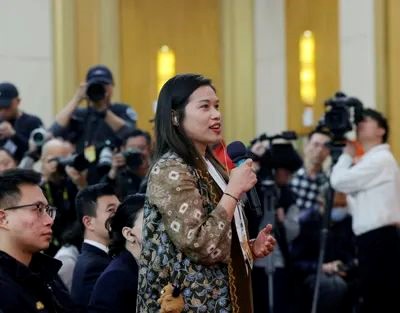
ANTARA News Agency: China and ASEAN member countries agreed to accelerate negotiations for a binding Code of Conduct (COC) for the South China Sea. What does China offer for a more harmonious and peaceful environment in the South China Sea?
Wang Yi: The Chinese people have lived by and worked in the South China Sea for generations. Since early days, the South China Sea Islands have been territories under the jurisdiction of the Chinese government in accordance with the law. Nowadays, the South China Sea is the busiest, safest and freest waterway in the world. For decades, fifty percent of the world’s merchant vessels have sailed through this waterway, accounting for one-third of maritime trade, and this has never been disrupted or hampered. Despite the turbulence in the world, peace and stability in the South China Sea have been maintained thanks to the collective efforts of China and ASEAN countries. This does not come by easily and should be dearly cherished.The most important experience we have drawn is that we must adhere to two principles. First, differences should be properly managed and resolved through dialogue, consultation, or negotiation between states directly involved. Second, peace at the sea should be upheld by China and ASEAN countries working together. These are also the core principles in the Declaration on the Conduct of Parties in the South China Sea (DOC) signed in 2002.On maritime disputes, China has been exercising a high degree of restraint. We maintain that parties should find solutions that are acceptable to each and all by working in the spirit of good-neighborliness and friendship, and on the basis of respecting historical and legal facts. But abusing such good faith should not be allowed. Distorting maritime laws cannot be accepted. In face of deliberate infringements, we will take justified actions to defend our rights in accordance with the law. In face of unwarranted provocation, we will respond with prompt and legitimate countermeasures. We also urge certain countries outside this region not to make provocations, pick sides, or stir up troubles and problems in the South China Sea.On upholding peace and stability in the South China Sea, it is important that China and ASEAN countries continue implementing the DOC, and at the same time accelerate negotiations on a COC, and establish regional rules that are more effective, substantive and in line with the international law including law of the sea. With strong efforts from China, the second reading of the COC was successfully completed and procedures for the third reading launched. We will work with ASEAN countries to strive for an early conclusion of the COC and to ensure that the South China Sea remains a sea of peace and cooperation.
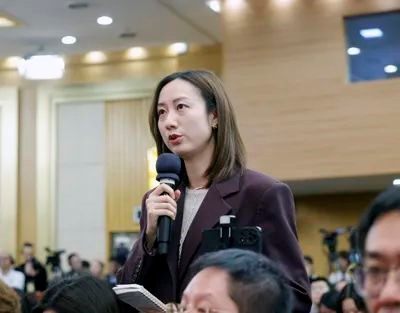
Phoenix TV: The international community has introduced proposals, one after another, for global AI governance. What is China’s position on cooperation between major countries on AI?
Wang Yi: Artificial intelligence is now at a crucial stage of explosive growth. We believe that there should be equal emphasis on development and security. New things and new opportunities should be embraced; and at the same time, brakes should be checked before setting off. Concerted efforts are needed to advance global governance on AI. The Global AI Governance Initiative put forward by President Xi Jinping last October has clearly laid out China’s position and proposals.Our main focus is to ensure three principles are met. First, ensure that AI is a force for good. Development of AI should be conducive to the welfare of all humanity, in line with ethics and norms, in conformity with the rules of international law, and in keeping with the trend of human civilization. Second, ensure safety. AI should always be placed under human control, with constantly improving interpretability and predictability. For that purpose, plans should be made to assess and control various kinds of risks. Third, ensure fairness. An international AI governance institution should be set up under the U.N. framework and all countries should be able to participate on equal terms in the process of AI development and share in its benefits fairly.I wish to stress that attempts to create “small yard, high fence” in AI development would result in mistakes with historic consequences. Such attempts cannot block other countries’ technological development. They would only fragment international industrial and supply chains and undercut humanity’s ability to tackle risks and challenges.China takes an active and open approach on AI cooperation with other countries and has established dialogue mechanisms with a number of countries. In the field of AI, cooperation between major countries is vital, so is capacity-building for developing countries. We will submit in due course to the U.N. General Assembly a draft resolution on enhancing international cooperation on capacity-building of artificial intelligence in order to encourage technology sharing among parties, bridge the AI divide, and leave no one behind.
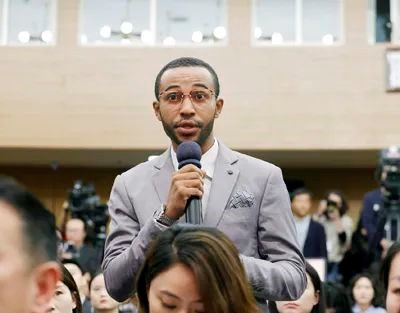
Zanzibar Broadcast Corporation: You visited Africa in January as a continuation of the tradition that Chinese foreign ministers make their first overseas trips to Africa at the beginning of a new year. So what will China do to consolidate its cooperation with African countries? Senior officials from the U.S. and other Western countries also paid frequent visits to Africa in recent years. Is China concerned about the competition from the West in relations with Africa?
Wang Yi: The tradition that Chinese foreign ministers start their overseas visits every year with a trip to Africa has continued for 34 years. This is unparalleled in the history of international exchanges. It is so because China and Africa are brothers treating each other with sincerity and sharing a common future. We have fought shoulder to shoulder against imperialism and colonialism. We have supported each other in pursuit of development. We have always stood for justice in a changing international landscape. Since the start of the new era, President Xi Jinping has put forth the principle of sincerity, real results, amity and good faith and called for taking the right approach to friendship and interests. The endeavour of building a China-Africa community with a shared future has thus been steered onto a fast track. China has remained Africa’s biggest trading partner for 15 years straight, and the pie of China-Africa cooperation is growing bigger. The Chinese and African people are feeling closer to each other. The Global South, including China and Africa, is growing fast and profoundly shaping the course of world history. African countries are experiencing a new awakening. Models imposed from outside have brought Africa neither stability nor prosperity. African countries need to explore development paths suited to their national conditions and keep their future and destiny firmly in their own hands. In this new historical process, China will continue to stand firmly with our African brothers and supports an Africa that is truly independent in thinking and ideas. China will assist Africa in building capacity for self-driven development and support faster modernization in Africa. China always holds that Africa should not be marginalized. While China-Africa cooperation thrives, other major countries have again turned their eyes to Africa. China welcomes that. We hope that, like China, all sides will pay greater attention to Africa and increase input to support Africa’s development. China stands ready for more trilateral and multilateral cooperation on the basis of respecting the will of Africa. The next meeting of the Forum on China-Africa Cooperation (FOCAC) will be held in China this autumn. Chinese and African leaders will gather in Beijing again after six years to discuss future development and cooperation and exchange governance experience. I believe that through this summit, China and Africa will enhance their long-standing friendship and deepen unity and collaboration to open up new vistas for faster common development and start a new chapter for a China-Africa community with a shared future.
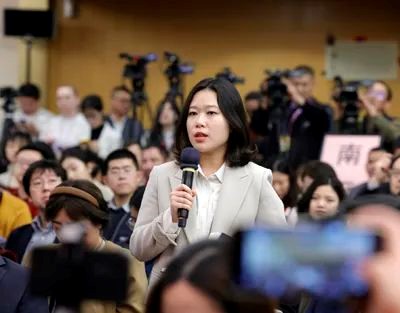
Korean Broadcasting System: On the Korean Peninsula issue, does the position of the Chinese government still hold? Recently, tensions have been rising on the Peninsula. Where does China see a way out of it?
Wang Yi: The Korean Peninsula issue has been lingering for years. It has a clear root cause. That is, Cold War vestiges persist, a peace mechanism remains absent, and the security issue is yet to be fundamentally resolved. It also has a ready script. This is what China envisages as the dual-track approach and the principle of phased and synchronized actions.Currently, tensions are rising on the Peninsula. This is not what China wants to see. The world is turbulent enough. Renewed conflict and turmoil should not happen on the Peninsula. Anyone trying to use the Korean Peninsula issue to revive the retrogressive Cold War confrontation will be held accountable by history; anyone undermining regional peace and stability will pay a heavy price.China maintains a consistent position on the issue. All our efforts come down to one thing—to champion peace, stability and lasting security on the Peninsula. The imperative now is to desist from acts of deterrence and applying pressure, and move out of the spiral of escalating confrontation. The fundamental solution lies in resuming dialogue and negotiation; addressing the legitimate security concerns of all parties, especially those of the DPRK; and advancing the political settlement of the Korean Peninsula issue.
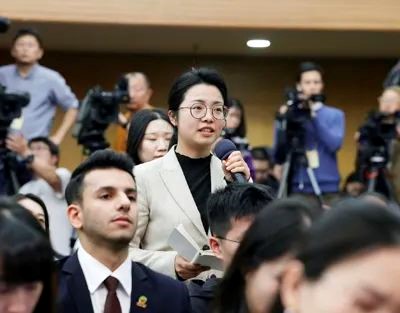
China Radio International: With global challenges emerging one after another, the international community looks to the U.N. to play a bigger role. But some major countries try to bypass the U.N. and form all sorts of “small circles.” How does China see the role of the U.N.? What are China’s suggestions for the reform of the U.N.?
Wang Yi: China always believes that there is only one system in the world, i.e. the international system with the U.N. at its core; there is only one order, i.e. the international order underpinned by international law; and there is only one set of rules, i.e. the basic norms of international relations based on the purposes and principles of the U.N. Charter. No country should do whatever suits it or reinvent the wheel. The crises and challenges seen in recent years serve as repeated warnings that the role of the U.N. should be strengthened, not weakened, and the status of the U.N. must be upheld, not replaced.Over the last 70 years and more since its founding, the U.N. has weathered wind and rain and withstood the impact of power politics. It remains the most universal, representative and authoritative intergovernmental organization, the core mechanism for achieving world peace and development, and an important platform for the many small- and medium-sized countries to participate in international affairs as equals.China is the first country to have signed on the U.N. Charter, the biggest contributor of peacekeepers among the permanent members of the Security Council, and the second largest contributor to the U.N.’s regular budget and peacekeeping assessment. In response to the development deficit, we advance the Global Development Initiative as a boost to the implementation of the U.N. 2030 Agenda for Sustainable Development. In response to the climate threat, we support U.N.-led international cooperation on climate change and will make the world’s biggest cut in carbon emission intensity in the shortest time frame ever seen in history.At the same time, the U.N. also needs to reform and improve in keeping with the times, to adapt to the new realities of international political and economic development and to increase the representation and say of developing countries. Major countries in particular need to assume their responsibilities and help the U.N., including its Security Council, to better fulfill its mandate, build global consensus more effectively, mobilize global resources, and coordinate global actions. China supports the U.N. in holding the Summit of the Future and reaching a Pact for the Future that benefits all parties. We will work with the international community to support the continuous development and improvement of the U.N. Taking international rule of law as the basis, fairness and justice as a principle, win-win cooperation as the goal and effective action as an orientation, we will practice true multilateralism and promote greater democracy and rule of law in international relations.
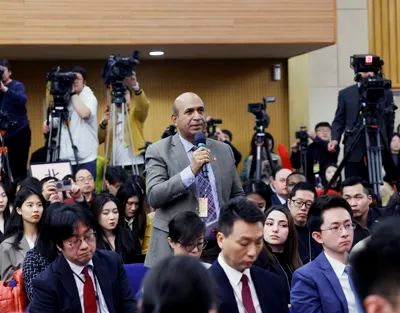
Associated Press of Pakistan: Over the past 10 years since President Xi Jinping put forward the Belt and Road Initiative, many countries have felt the tangible benefits from the Initiative. Could you share the outlook for Belt and Road cooperation in the next stage?
Wang Yi: Since President Xi Jinping put forward the BRI more than 10 years ago, Belt and Road cooperation has produced fruitful outcomes. The BRI has become the most popular global public good and the largest platform for international cooperation. It has also become a pathway to cooperation, opportunity and prosperity for partner countries seeking joint development. At the Third Belt and Road Forum for International Cooperation, President Xi Jinping announced eight major steps that China would take, marking a new stage in high-quality development of Belt and Road cooperation. China will work with all parties to uphold the Silk Road spirit, deliver on the outcomes of the Forum, and usher in a second golden decade of Belt and Road cooperation.We will promote the upgrading of physical connectivity. We will continue to develop a multidimensional global infrastructure connectivity network that is high-quality, sustainable and resilient and covers sea, land and air. We will accelerate the development of a digital Silk Road, redouble efforts to build a green Silk Road, and work with BRI partners in addressing various new challenges. We will promote the strengthening of institutional connectivity. We will stay committed to the principle of “planning together, building together and benefiting together,” stick to the philosophy of open, green and clean cooperation, and keep to the goal of pursuing high-standard, people-centered and sustainable cooperation. We will seek greater synergy between the BRI and the development strategies of all sides, promote both signature projects and small and beautiful programs, and make active efforts for an open world economy. We want to make the BRI a lasting opportunity shared by all.We will promote the deepening of people-to-people connectivity. We will have more inter-civilizational dialogue among BRI partners, support nongovernmental and subnational exchanges, and carry out a wide range of cultural and people-to-people interactions, so that the Silk Road spirit will take hold in people’s hearts.The type of modernization China pursues is not one that benefits China alone. We hope that high-quality Belt and Road cooperation will serve as an engine of the common development of all countries and an accelerator for the modernization of the whole world.
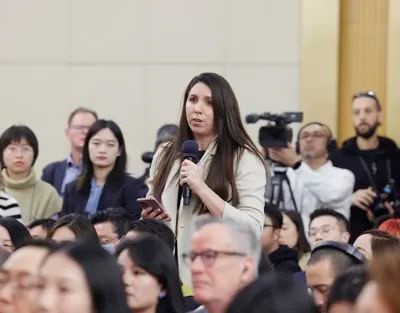
Prensa Latina: Last year, the BRICS mechanism achieved a historic expansion, and Cuba successfully hosted the Summit of the Group of 77 and China. Some media outlets and scholars believe that the Global South is challenging the international order led by the West. As an important member of the Global South, what is China’s comment?
Wang Yi: A stronger BRICS means growing force for peace and increasing international support for justice. It should not be seen as a challenge. In a broader sense, BRICS expansion reflects the collective rise of the Global South and a world evolving faster toward multipolarity. Consisting of emerging markets and developing countries, the Global South now takes up over 40 percent of the world economy, changing the global economic landscape in a profound way. Independence is its distinct quality and seeking strength through unity is its tradition. The Global South is no longer the “silent majority,” but a key force for reforming the international order and a source of hope as the world undergoes profound changes unseen in a century.China was, is and will be a steadfast member of the Global South. We go through thick and thin and head toward a shared future together with countries of the South, and we are always a crucial force for the development and prosperity of the Global South.This year will be a year of harvest for Global South cooperation, and a new starting point for unity among Asian, African and Latin American countries. The China-Arab States Cooperation Forum will celebrate its 20th anniversary. The China-CELAC Forum will count 10 years of productive cooperation. Another FOCAC Summit will take place in China this coming autumn. China looks forward to jointly celebrating the milestones with various parties, and continuing to promote unity and cooperation among developing countries to augment the strength of the South. China also supports Russia in holding the summit of the “greater BRICS” following its membership enlargement, and supports Brazil and Peru in holding the G20 Leaders’ Summit and the APEC Economic Leaders’ Meeting respectively to jointly create a shining “South moment” in global governance.
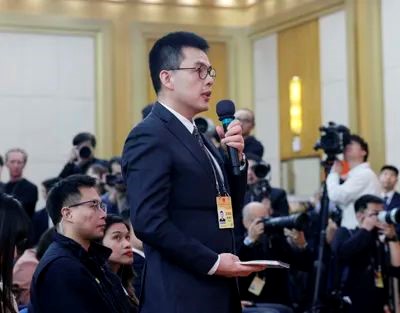
China Daily: Last year, more than 1,500 Chinese nationals were evacuated from Sudan and returned to safety in China. What more can we expect this year from the Foreign Ministry in terms of “diplomacy for the people?”Wang Yi: In a year of changes and confusion around the world, the CPC Central Committee kept close to its heart the safety of all Chinese compatriots abroad. Throughout the year, the Ministry and our missions all over the world spared no effort to bring heartwarming care from the CPC Central Committee to all compatriots.We strengthened consular protection abroad, handling more than 80,000 cases of various types and issuing more than 6,000 reminders and alerts. We evacuated thousands of Chinese nationals from Sudan, Palestine, Israel and other places, doing our best to protect the life and safety of Chinese nationals abroad. We continued to improve the functions of the “China Consular Affairs” app and responded to more than 530,000 calls seeking help on the consular service hotline 12308. We made Chinese passports stronger; more than 20 countries, such as Singapore, Malaysia and Thailand, now have mutual visa waivers with China for all types of passports. China also promulgated its first Regulations on Consular Protection and Assistance, to make for law-based, institutionalized and standardized consular protection.Practicing diplomacy for the people is a ceaseless endeavor. This year, we will focus on three priorities:First, we will make full efforts to strengthen the system for the protection of Chinese nationals and interests abroad. We will spread the knowledge about consular protection, work more effectively to issue security risk alerts, further improve the 12308 hotline, and provide efficient, responsive and whole-process services on the consular protection platform.Second, we will continue to build fast-track networks for cross-border travels. We will work for faster recovery of international passenger flights, and make arrangements with more countries for visa-free travels and multi-year, multi-entry visa options.Third, we will continue to improve in-person and online consular services. We will upgrade the “China Consular Affairs” app and equip our missions abroad with smart consular service centers, to deliver finer and easier consular services to overseas Chinese.My message is this: China carries out diplomacy for its people. Serving the people and meeting our compatriots’ expectations is our abiding mission.

China Arab TV: Last year, China’s voice grew stronger in the world and more are hoping to learn about China’s stories. What in your eyes is most notable and significant about China’s stories in the new era? What can foreign journalists do in communicating China’s stories?
Wang Yi: This is a good question. Over the past few years, foreign journalists in China have covered many lively stories about China: from a string of Shenzhou space missions to the Fendouzhe submersible diving in the deepest oceanic trench, from reversing desertification to promoting low-carbon lifestyle, from the Asian Games in Hangzhou to the basketball games in rural Guizhou province called VBA. You have told the world inspiring stories of 1.4 billion people working as one for the Chinese Dream. You have shown the world a vibrant China in the new era. Let me take this opportunity to express my sincere appreciation for the good work of our friends from the media.China’s stories are fascinating. They are first and foremost stories of the CPC. For over a century, the CPC has rallied and led the Chinese people in a tireless endeavor, blazing the Chinese path to modernization and creating development miracles unseen in human history. This is the leading theme of the stories about China. China’s stories are essentially stories of the Chinese people. The people are the lead characters of China’s stories. Under the leadership of the CPC, the 1.4 billion-plus Chinese people have been working tenaciously and building happy lives with their own hard work. This is the most notable chapter in China’s stories. China’s stories are also stories of common progress of China and the rest of the world. China keeps its development closely linked with that of other countries. Taking determined steps to reform and open up, China has grown stronger and brought benefits to the world. This is the most far-reaching part of China’s stories.You ask why good storytelling about China is important. People need to realize that China’s stories do not exist in isolation. They are instead important chapters of the stories of humanity. They speak to a truth: when countries proceed from their own national conditions to explore modernization paths, they will together make up a new, colorful vista of world modernization.There are more foreign journalists telling China’s stories. One of them sees it as a lifelong mission because China is a place that makes the impossible possible. I can see more foreign influencers becoming popular with viewers from around the world for sharing their experiences in China. More foreign friends are welcome to join us in telling the stories of an energetic, bustling China and of China working hand in hand with other countries to build a community with a shared future for mankind.
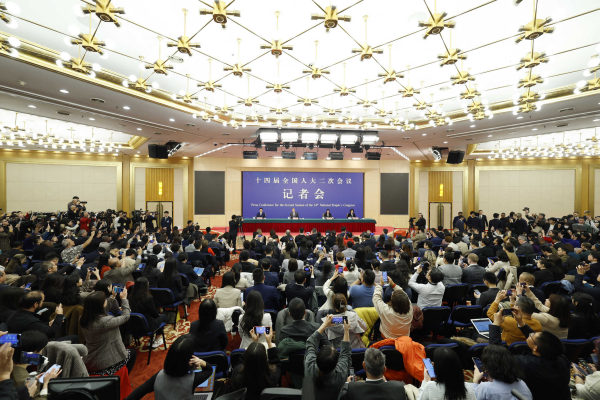
The press conference lasted 90 minutes
(Xinhua / TPA)






